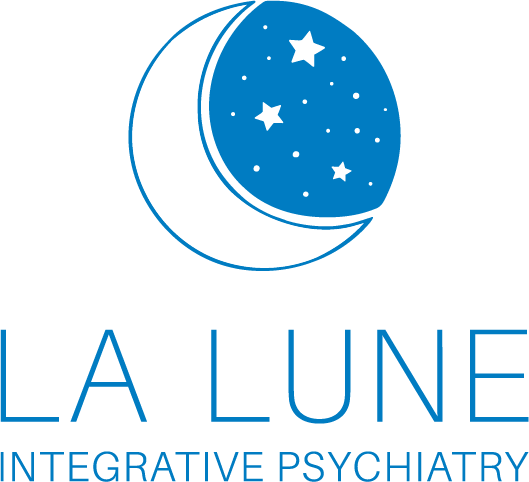Responsible Prescribing: Controlled Medications
In 2023, the Drug Enforcement Agency (DEA) extended flexibility for telehealth prescribing of controlled medications, allowing practices like ours to continue prescribing remotely — at least through December 31, 2025 — under current rules.
If future regulations require in-person visits for controlled prescribing, we will adapt our process accordingly and keep you informed.
How prescribing decisions work
All prescription decisions are based on clinical judgment, not patient requests alone. We do not promise any particular medication — controlled or otherwise — before your evaluation.
We combine therapy and medication care into longer, more thoughtful appointments so your provider gets the full picture of your needs and history. We also use evidence-based clinical policy and standard safety practices to guide every prescribing decision.
Examples of controlled medications
To help clarify what “controlled medications” means, here are some commonly regulated medications (this is not a guarantee that we can or will prescribe them):
Stimulants / ADHD-type medicines: Adderall, Ritalin, Vyvanse, Concerta
Anxiolytics / sedative / sleep medicines: Xanax, Valium, Klonopin, Ambien, Lunesta
Others sometimes regulated under schedules
How often appointments occur
If you are prescribed any medication — especially a controlled one — we typically schedule regular virtual follow-ups (e.g. monthly) before authorizing refills. This helps ensure we’re monitoring response, safety, and ongoing suitability.
-
We provide comprehensive, evidence-based psychiatric care through telehealth. Our board-certified psychiatric nurse practitioners offer evaluation, diagnosis when appropriate, and personalized treatment plans that may include therapy, lifestyle recommendations, and medication management.
Our goal is to make mental health care accessible, thoughtful, and collaborative.
-
Our care team is made up entirely of board-certified psychiatric mental health nurse practitioners (PMHNP-BC).
Each psychiatric nurse practitioner is licensed in the state(s) where they see patients and provides care that meets professional standards. They are able to provide both therapy and medication management for mental health conditions.
-
Yes. Our clinicians can prescribe a wide range of psychiatric medications used to treat conditions such as anxiety, depression, insomnia, ADHD, and other mental health conditions. We also combine supportive therapy with medication management.
Some medications — known as controlled medications — have additional federal and state regulations. Whether a controlled medication can be prescribed depends on both clinical appropriateness and whether your provider holds the necessary DEA registration and state-level authorization where you are located.
About Our Care
About Controlled Medications
-
Certain psychiatric medications — including some ADHD, anxiety, and sleep medicines — are more tightly regulated under federal and state law. These are known as controlled medications and have the potential for dependence and tolerance.
Examples include Adderall, Ritalin, Vyvanse, Xanax, Valium, Klonopin, and Ambien.
These examples are provided only to help clarify the term “controlled medication,” and is not an exhaustive list.
-
All medication decisions are always made after a full clinical evaluation. Your provider considers your symptoms, treatment history, goals, and safety factors, along with applicable state and federal prescribing rules.
If a controlled medication is determined to be appropriate and legally permitted in your state, your provider will review potential benefits, considerations, and alternatives with you before moving forward.
-
Certain medications are classified as controlled substances because they have the potential for dependence and tolerance if not used carefully.
For that reason, they are regulated by the U.S. Drug Enforcement Administration (DEA) and by individual state agencies to promote safe and appropriate prescribing. -
During the COVID-19 public health emergency, federal regulators temporarily allowed some controlled medications to be prescribed via telehealth without an in-person visit.
Those flexibilities have been extended while the DEA finalizes long-term telemedicine prescribing rules (currently expected to remain in place through at least December 2025).
This means that, for now, certain controlled medications may be prescribed remotely when clinically appropriate and legally permitted.
If federal or state regulations change and an in-person visit becomes required, your provider will guide you through next steps to maintain continuity of care.
-
Your safety and wellbeing are at the center of every decision.
Our clinicians follow best-practice standards that include:
Verifying identity and confirming state of residence during each appointment
Reviewing relevant prescription history through state databases (where available)
Discussing benefits, risks, and alternatives before prescribing
Scheduling appropriate follow-ups to monitor response and safety
Adjusting or discontinuing medications as needed based on clinical progress
Our treatment plans are designed to support long-term wellness and safety.
-
Follow-up frequency depends on your treatment plan and individual needs.
Early in care, visits are often more frequent to ensure your treatment is working well. Over time, sessions may become less frequent as things stabilize. A recent assessment is often required for a refill of medications.
Your provider will discuss and adjust the schedule based on your progress.
Safety, Monitoring & Follow-Up
-
Our psychiatric nurse practitioners are licensed in specific states. You must be physically located in a state where your provider is licensed at the time of your appointment.
If you move or travel, let us know so we can confirm licensing coverage or assist with transitioning your care if needed.
-
Some situations — such as certain controlled medication prescriptions, urgent safety concerns, or physical assessments — may require in-person evaluation.
When that’s the case, we’ll coordinate with local clinicians or your primary care provider to ensure a smooth and supportive transition. -
You can begin by completing our brief intake form, which helps us connect you with a psychiatric nurse practitioner licensed in your state.
Your first session will focus on understanding your concerns, reviewing your history, and developing a care plan tailored to your needs.

